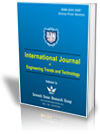Robust Routing Protocol for Ad-hoc Networks
Citation
Prof.Priyadarshini, Poornima, Preeti, Renuka, Soumya "Robust Routing Protocol for Ad-hoc Networks", International Journal of Engineering Trends and Technology (IJETT), V47(6),349-352 May 2017. ISSN:2231-5381. www.ijettjournal.org. published by seventh sense research group
Abstract
Wireless sensor systems (WSNs) are defenseless to particular sending assaults that can malignantly drop a subset of sending parcels to debase arrange execution also, endanger the data uprightness. In the mean time, due to the flimsy remote divert in WSNs, the bundle misfortune rate amid the correspondence of sensor hubs might be high and differ now and again. It represents an awesome test to recognize the malignant drop and ordinary parcel misfortune. In this paper, we propose a Channel-mindful Reputation System with versatile identification limit (CRS-A) to recognize particular sending assaults in WSNs. The CRS-An assesses the information sending practices of sensor hubs, as per the deviation of the observed parcel misfortune and the evaluated ordinary misfortune. To upgrade the identification precision of CRS-A, we hypothetically determine the ideal edge for sending assessment, which is versatile to the time varied channel condition and the evaluated assault probabilities of traded off hubs. Besides, an assault tolerant information sending plan is created to team up with CRS-A for empowering the sending participation of traded off hubs what’s more, enhancing the information conveyance proportion of the system. Broad recreation comes about exhibit that CRS-A can precisely recognize particular sending assaults and distinguish the traded off sensor hubs, while the assault tolerant information sending plan can altogether enhance the information conveyance proportion of the system.
References
[1] I. Butun, S. Morgera, and R. Sankar, “A survey of intrusion detection systems in wireless sensor networks,” IEEE Commun. Surv. & Tutor., vol. 16, no. 1, pp. 266–282, 2014.
[2] Y. Zou, X. Wang, and W. Shen, “Physical-layer security with multiuser scheduling in cognitive radio networks,” IEEE Trans. Commun., vol. 61, no. 12, pp. 5103–5113, 2013.
[3] B. Xiao, B. Yu, and C. Gao, “Chemas: Identify suspect nodes in selective forwarding attacks,” J. Parallel Distributed Comput., vol. 67, no. 11, pp. 1218–1230, 2007.
[4] Y. Zhang, L. Lazos, and W. Kozma, “Amd: Audit-based misbehavior detection in wireless ad hoc networks,” IEEE Trans. Mob. Comput., prePrints, published online in Sept. 2013[3] Dhurandher, S.K., Khairwal, S. Obaidat, M.S. Misra, S., "Efficient data acquisition in underwater wireless sensor Ad Hoc networks," in Wireless Communications, IEEE , vol.16, no.6, pp.70-78, December 2009.
[5] S. Ozdemir, “Functional reputation based reliable data aggregation and transmission for wireless sensor networks,” Comput. Commun., vol. 31, no. 17, pp. 3941–3953, 2008.
[6] D. Hao, X. Liao, A. Adhikari, K. Sakurai, and M. Yokoo, “A repeated game approach for analyzing the collusion on selective forwarding in multihop wireless networks,” Comput. Commun., vol. 35, no. 17, pp. 2125–2137, 2012.
[7] X. Liang, X. Lin, and X. Shen, “Enabling trustworthy service evaluation in service-oriented mobile social networks,” IEEE Trans. Parallel Distr. Sys., vol. 25, no. 2, pp. 310–320, 2014.
[8] J. Ren, Y. Zhang, K. Zhang, and X. Shen, “Sacrm: Social aware crowdsourcing with reputation management in mobile sensing,” Computer Commun., vol. 65, no. 15, pp. 55–65, 2015.
[9] L. Yu, S. Wang, K. Lai, and Y. Nakamori, “Time series forecasting with multiple candidate models: selecting or combining,” J. Sys. Sci. Complexity, vol. 18, no. 1, pp. 1–18, 2005.
[10] J. Ren, Y. Zhang, K. Zhang, and X. Shen, “Exploiting channel-aware reputation system against selective forwarding attacks in wsns,” in Proc. IEEE GLOBECOM, 2014, pp. 330–335.
Keywords
Adpative, WSN, selective forwarding attack, reputation system, packet dropping, channel-aware, routing.



